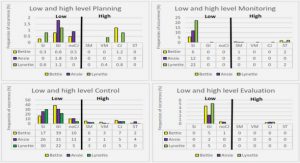Get Complete Project Material File(s) Now! »
INTRODUCTION
In his letter to the Philippians, Paul persuades his readers to be humble, obedient, to reject honor-competition, and he cites Christ as an example of such behavior (2:5). At the same time we can see that Paul himself is not that uninterested in gaining honor: he knows that he will not be ashamed (1:20), he aspires to reward with glory from God (1:20-21; 2:16; 3:14). He wants to repeat Christ’s way not only in humbling himself, yet also in God’s appraisal of him (2:9-11; 3:21). If one humiliates
oneself in order to get honor and praise, is this a genuine humiliation? If one rejects oneself in order to get much more from the other source, is that a true authentic self-denial or is it just a way to get what one wants to get? This study aims to clarify this contradiction and to find out what is “honor” and what is the difference between honor from people (which Christians are to reject) and honor from God (which they are to aspire to receive).
Hypothesis
Our hypothesis is that in his letter to Philippians, Paul speaks not about rejecting honor, yet about rejecting certain sources of honor: the apostle looks for appreciation, for positive merit rating from God alone, and he wants his readers to do the same. One’s source of honor (i.e. “significant other”) is at the same time one’s source of identity: it is a person or a group with whom one associates oneself and who’s evaluation is significant to one. Because of their correlation and interdependence, identity and honor are two major analytical concepts of our study.
Methodology
As both honor and identity are sociological categories, social analysis of the text is the main methodology of this research. Yet a social-scientific approach to the New Testament texts contains some methodological issues, which have to be addressed prior to any application of it. Firstly, is the usage of contemporary social theories and terminology with regard to biblical texts justifiable? And secondly, may one expect to find in the biblical texts the social patterns, which existence was proposed by scientists only in the 20th century? The answer to these questions can be given in two
ways. Firstly, the ability and necessity to build, maintain and develop social relations, as well as to analyze these relations, are biological characteristics of homo sapiens. And as the ancient and contemporary people belong to one biological species, it is reasonable to suppose that “both our and their minds create culture with the same basic cognitive capacities.”Hence, one may make an assumption that people of the past also verbalized their understanding of their social interactions, though they could use different vocabulary (both linguistically and conceptually).The cognitive discourse analysis might help to understand both ancients’ and contemporary researchers’ ways of conceptualizing and its articulation.After all, analogy is the way one cannot escape studying ancient times. Secondly, the contemporary social and psychological theories can be applied to the Bible texts as an heuristic method,and then careful exegesis, as well as analysis of other sources,is needed to prove or disprove the adequacy of such application.
The research history and the research problem
The Christian movement originated from within the Jewish community and was thoroughly Jewish in the beginning. Yet quite soon it moved beyond its Jewish ethnic and religious borders and by the middle of the century the amount of Gentiles among the followers of Jesus was so big that the Jerusalem Council was held to formulate a set of certain boundaries which would separate Christian communities from a polytheist world without making the converted Gentiles to become Jewish (Acts 15:1-29). The difficulties of finding this new identity of a new religious community are reflected in the New Testament texts, especially in the letters of Paul, who believed his specific mission was to invite Gentiles into the Christian commune (Gal 1:16).
ABSTRACT
ACKNOWLEDGEMENTS
CHAPTER 1. INTRODUCTION
1.1 Hypothesis
1.2 Methodology
1.3 The research history and research problem
1.4 The outline of the research
CHAPTER 2. SOCIAL VALUES AND IDENTITY IN THE LETTER TO THE PHILIPPIANS
2.1 Key terms: values and identity
2.1.1 Values and culture
2.1.2 Identity
2.1.3 An individual and a group: dynamic of relations
2.1.4 Honor, shame and “significant other”
2.2 Honor in the ancient Mediterranean World
2.2.1 Specific features of Mediterranean honor and shame system
2.2.2 Honor and power dynamics: patronage, friendship and benefactor beneficiary relationship
2.3 Honor and identity in ancient Philippi
2.4 Conclusions
CHAPTER 3. NEW IDENTITY OF HEAVENLY SOCIETY MEMBERS
3.1 Negative identity: “we” vs. “them
3.1.1 Internal opponents: 1:15-17; 2:3-4; 2:21
3.1.1.1 Wrong-motivated brothers
3.1.1.2 Inspired by Paul’s imprisonment
3.1.1.3 The cause of the conflict
3.1.2 External opponents: “dogs” and enemies of Christ (3:2; 3:18-19)
3.1.3 Mixed opponents: 1:28-30
3.1.4 Opponents as one group
3.1.5 Opponents in the letter to the Philippians: those, who are not “us”
3.2 Positive identity: unity in Christ
3.2.1 The language of positive identity throughout the letter
3.1.2 Explicit admonitions for unity
3.3 Paul’s own example of the changed identity (3:4-11)
3.3.1 Paul’s old identity: peritomh/| ovktah,meroj (3:5-6)
3.3.2 Changing point: dia. to.n Cristo,n (3:7-8)
3.3.3 Conclusion: Paul’s new identity in Christ
3.4 Conclusion: accentuating the new identity as an exercise of the value of belonging
CHAPTER 4. PAUL’S ARGUMENTATION OF HONOR-VALUE: DEALING WITH HONOR IN HEAVENLY SOCIETY
4.1 Christological hymn: Christ’s way of dealing with honor
4.1.1 Christ’s interaction with God in terms of honor
4.1.2 The meaning of 2:6
4.1.3 The essence of Christ’s kenosis: obedience to God
4.1.4 God as the ultimate significant other
4.1.5 The hymn’s context: application of the hymn
4.1.5.1 Unity and rejection of the competition (2:1-5)
4.1.5.2 Obedience of God’s children: (2:12-30)
4.1.6 Conclusion
4.2 Paul’s own dealing with honor throughout the letter
4.2.1 New source of ke,rdh
4.2.2 Christ as the source of honor and source of identity
4.2.3 God as the only source of honor: the conflict of identities
4.3 Conclusion: Poli,teuma evn ouvranoi/j: keeping values, changing identity
CHAPTER 5. CONCLUSION
5.1 Introduction
5.2 Survey of the study
5.3 Conclusions
5.4 Contribution of this study
5.5 Applications
5.6 Perspectives for further studies
BIBLIOGRAPHY
GET THE COMPLETE PROJECT
SOCIAL VALUES OF HEAVENLY SOCIETY: THE CONCEPTS OF HONOR AND IDENTITY IN PAUL’S LETTER TO PHILIPPIANS





